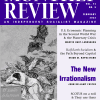
The Fishing Revolution and the Origins of Capitalism
The Fishing Revolution is a rarely explored, yet critical, event in the evolution of capitalism. Ian Angus elaborates on this revolution in the global marketplace and its role as a cornerstone of imperialism, colonialism, and capitalism in the sixteenth and seventeenth centuries. | more…

Limits to Supply Chain Resilience: A Monopoly Capital Critique
Capital, Ben Selwyn writes, has been advancing its interests under the guise of protecting “global supply chain resilience.” While those promoting the resilience agenda assert that these supply chains represent a net benefit, evidence suggests that they increase the transfer of surplus value from the Global North and, especially, in the. South. | more…

Prioritizing U.S. Imperialism in Evaluating Latin America’s Pink Tide
Steve Ellner analyzes the debate surrounding the wave of elections of left-leaning political leaders in Latin America, known as the Pink Tide. Critics of these governments, Ellner suggests, emphasize their shortcomings at the expense of recognizing their anti-imperial position. | more…

The Communitarian Revolutionary Subject and the Possibilities of System Change
As capitalism continues to fuel the planetary crisis, David Barkin and Brian M. Napoletano propose that the communitarian revolutionary subject is already prefiguring alternatives constructed around the principles of self-determination, substantive equality, and sustainability. | more…

The new normal
A new poem by Marge Piercy. | more…

The Puzzle of Financialization
In this reprise from October 1993, Henry Magdoff and Paul Sweezy ask: “Isn’t there anyone around here who understands how this capitalist system works?” | more…

February 2023 (Volume 74, Number 9)
As C. Wright Mills wrote in 1958, “the immediate causes of World War III are the preparations for it.” This month’s “Notes from the Editors” situates Mills’s words in a contemporary context, with a New Cold War in full swing and imperial powers pushing us ever closer to a Third World War. | more…

The New Irrationalism
February’s Review of the Month confronts the new irrationalism and its reactionary tendencies, which find their roots in troubling philosophical and historical foundations. The answer, John Bellamy Foster writes, can be found in a return to historical materialism. | more…

U.S. Economic Planning in the Second World War and the Planetary Crisis
Martin Hart-Landsberg revisits the history of the industrial re-organization of the U.S. economy during the Second World War. What can we learn from our past about the systemic changes necessary to face our future? | more…

Half-Earth Socialism and the Path Beyond Capital
The Half-Earth movement calls for rewilidng half the earth as a means of combating the planetary crisis. Brian Napoletano explores the implications of the Half-Earth approach as outlined Vettese and Pendergrass’s Half-Earth Socialism. | more…

SCOTUS on a roll
A new poem by Marge Piercy. | more…

They use their religion to kill
A new poem by Marge Piercy. | more…

Abortion—The Real Irish Lessons
Tomás Mac Sheoin reviews Road to Repeal, which documents the struggle for abortion rights in Ireland, from its constitutional prohibition to the ban’s repeal in 2018. | more…